

Official doubletalk hides serious problems with flu shot safety and effectiveness. Fluinfo. Pentagon Study: Flu Shot Raises Risk of Coronavirus by 36% (and Other Supporting Studies) The results of many peer-reviewed, published studies prove that the recommendation to get a flu shot because it will help you fight COVID-19 is bad advice and completely false.
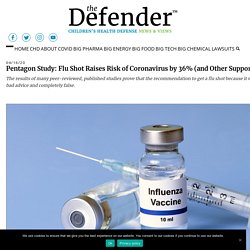
By Robert F. Kennedy, Jr., Chairman, Children’s Health Defense On March 12th, 2020, Anderson Cooper and Dr. Sanjay Gupta held a global town hall on “Corona Facts and Fears.” During the discussion, Anderson said to the viewing audience, “And, again, if you are concerned about coronavirus, and you haven’t gotten a flu shot…you should get a flu shot.” Setting safety and efficacy of influenza vaccination aside, is Anderson’s claim that the flu shot will help people fight COVID-19 remotely true? In fact, the results of many peer-reviewed, published studies prove that Anderson’s recommendation may have been the worst advice he could have given the public. Association of spontaneous abortion with receipt of inactivated influenza vaccine containing H1N1pdm09 in 2010-11 and 2011-12 - PubMed.
Introduction: Inactivated influenza vaccine is recommended in any stage of pregnancy, but evidence of safety in early pregnancy is limited, including for vaccines containing A/H1N1pdm2009 (pH1N1) antigen.
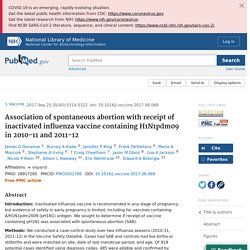
We sought to determine if receipt of vaccine containing pH1N1 was associated with spontaneous abortion (SAB). Methods: We conducted a case-control study over two influenza seasons (2010-11, 2011-12) in the Vaccine Safety Datalink. Cases had SAB and controls had live births or stillbirths and were matched on site, date of last menstrual period, and age. Of 919 potential cases identified using diagnosis codes, 485 were eligible and confirmed by medical record review. Children Who Get Flu Vaccine Have Three Times Risk Of Hospitalization For Flu, Study Suggests. The inactivated flu vaccine does not appear to be effective in preventing influenza-related hospitalizations in children, especially the ones with asthma.
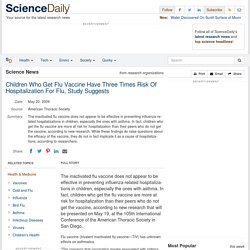
In fact, children who get the flu vaccine are more at risk for hospitalization than their peers who do not get the vaccine, according to new research that will be presented on May 19, at the 105th International Conference of the American Thoracic Society in San Diego. Flu vaccine (trivalent inactivated flu vaccine—TIV) has unknown effects on asthmatics. "The concerns that vaccination maybe associated with asthma exacerbations have been disproved with multiple studies in the past, but the vaccine's effectiveness has not been well-established," said Avni Joshi, M.D., of the Mayo Clinic in Rochester, MN.
"This study was aimed at evaluating the effectiveness of the TIV in children overall, as well as the children with asthma, to prevent influenza-related hospitalization. " Increased Risk of Noninfluenza Respiratory Virus Infections Associated With Receipt of Inactivated Influenza Vaccine. Rifkin 2018 5 ARI after flu vaccine in children. Vaccine 2018. Influenza vaccination and respiratory virus interference among Department of Defense personnel during the 2017–2018 influenza season. 1.
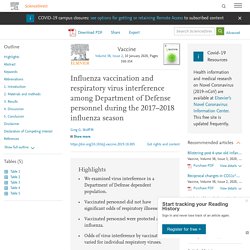
Introduction The influenza pandemic of 1918–1919, which contributed to an estimated 50 million deaths worldwide, stimulated interest in influenza vaccine research [1]. Twenty years after the pandemic began, the first influenza vaccine was administered to US soldiers in 1938 [1]. From the 2010–2011 influenza season to the 2017–2018 season, excluding for the 2014–2015 season, the influenza vaccine was shown to be effective at reducing the burden of seasonal influenza in the United States [2], [3], [4], [5], [6]. While influenza vaccination offers protection against influenza, natural influenza infection may reduce the risk of non-influenza respiratory viruses by providing temporary, non-specific immunity against these viruses [7], [8]. 2. The Department of Defense Global Respiratory Pathogen Surveillance Program (DoDGRS) is a DoD-wide program established by the Global Emerging Infections Surveillance and Response System (GEIS). 3.
Table 1. Table 2. Table 3. Table 4. Table 5. 4. 5. Getting flu shot 2 years in a row may lower protection. Mar 1, 2013 (CIDRAP News) – Experts are puzzled by a new study in which influenza vaccination seemed to provide little or no protection against flu in the 2010-11 season—and in which the only participants who seemed to benefit from the vaccine were those who hadn't been vaccinated the season before.
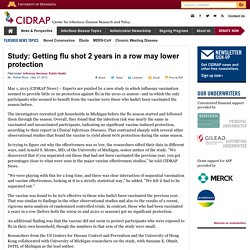
The investigators recruited 328 households in Michigan before the flu season started and followed them through the season. Overall, they found that the infection risk was nearly the same in vaccinated and unvaccinated participants, indicating no significant vaccine-induced protection, according to their report in Clinical Infectious Diseases.
That contrasted sharply with several other observational studies that found the vaccine to yield about 60% protection during the same season. In trying to figure out why the effectiveness was so low, the researchers sifted their data in different ways, said Arnold S. Monto, MD, of the University of Michigan, senior author of the study. See also: Increased Risk of Noninfluenza Respiratory Virus Infections Associated With Receipt of Inactivated Influenza Vaccine. We use cookies to enhance your experience on our website.
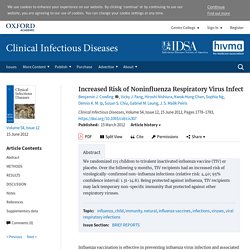
By clicking 'continue' or by continuing to use our website, you are agreeing to our use of cookies. You can change your cookie settings at any time. We use cookies to enhance your experience on our website.By continuing to use our website, you are agreeing to our use of cookies. You can change your cookie settings at any time. <a href=" Find out more</a> Skip to Main Content. Flu.VaXism.com. Macrophage Death following Influenza Vaccination Initiates the Inflammatory Response that Promotes Dendritic Cell Function in the Draining Lymph Node. - PubMed - NCBI. Suppression by thimerosal of ex-vivo CD4+ T cell response to. Nowak. Devastating Flu Vaccine-Miscarriage Study Sparks Ridiculous Spin. Children Who Get Flu Vaccine Have Three Times Risk Of Hospitalization For Flu, Study Suggests. Increased risk of noninfluenza respiratory virus infections associated with receipt of inactivated influenza vaccine. - PubMed - NCBI.